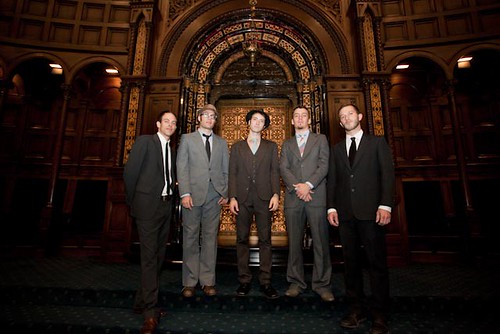 Review: Road To Damascus
Review: Road To Damascus
Municipale Balcanica
Of the growing number of Klezmer/Balkan bands in Italy, Municipale Balcanica has the widest reach. And it’s fairly obvious why. Their ability to absorb the music of other cultures and then filter it through an Italian sensibility gives a fresh vibe to the genre. MB (as they like to be called) are a collective of highly talented musicians, but beyond that they bring a spirit to the music that cannot be denied. From a frenzy to slow, beautiful melodies, to peaceful meditation, to their plea for peace where there is war, MB has the ability to evoke all of these emotions from their listeners.
Their second album,
Road To Damascus, encompasses all of these qualities. There is a broad range of emotions and musical styles here, and that translates into a thoroughly enjoyable listening experience.
Road To Damascus, besides being the title track, is a good description of what this project is all about: The journey the band figuratively takes from their small town in southern Italy passing through the Balkans, Turkey, and the Middle East, with excursions to Eastern Europe and North Africa. Italians have been world explorers since the days of Columbus, so it comes as no surprise that a musical curiosity is what drives MB to explore, embrace, and thrive on the musical styles of other cultures.
The CD booklet tells in a poetic way the context for the album:
Damascus is far away,
And the road to get there
Is never safe
And that’s why it is fascinating…
And first you meet ancient tales
And dances
And feasts
And tears
And wars
And games
And light
And then you tell stories never heard before
Damascus is near
And the road to get there
Is always dangerous
Is always awesome
MB’s Italian-infused Balkan/Klezmer style is best exemplified by the opening track,
Gypsy Train, with its alternating between a fast two-beat rhythm and a Bulgar rhythm. This is their signature sound, and provides a reference for the rest of the album. Other tracks that are styled along these lines are
Libano and
Alma Cocek.
Jewish music is a big part of the MB mix, as heard on
Kolomeyka and
Hava Nagila Club Version.
Kolomeyka is the song familiar to fans of Klezmer music, and they perform a good, straightforward version of it. On the other hand, the remix of
Hava Nagila gives us a fresh look at what is arguably the most recognizable Jewish melody. Trust me, you haven’t heard it this way before. And note the excellent Violin solo.
The Vocal songs on the album are of a wide variety.
L’orso Ballerino (The Amazing Dancing Bear) is sung in Italian and sounds a bit like Italian circus music, which would be natural to accompany a dancing bear, but has some Balkan background lines from the band as well. My favorite vocal is
L’Aria Migliore (Freshest Air). The Italian language sound beautiful, even if you don’t understand it, and the vocal style on this song is reminiscent of the almost whispering style of the Brazilian singer Joao Gilberto. This is a lovely song, and includes a sensitive Flugelhorn solo by Paolo Scagliola, who adds so much throughout the album.
Usti, Usti Baba is a song from Macedonia, sung in the original language. The band does a great job as a Balkan brass band to back the vocal. This song is traditionally performed just before the wedding ceremony. But the addition of grunge Guitar makes it a bit more Punk- just the right ingredient for MB to make it their own.
Contessa (bonus track) begins with a Piano solo before the band comes in and the Italian vocal begins. I don’t have the English translation, but the song sounds like a lot of fun for the band.
Some songs lean more toward a Middle Eastern/North African sensibility.
Artigiana Di Luma has a Balkan background rhythm and Turkish melody.
Radish Lam is my favorite song on the album. Starting with and old scratchy 78 record sound then moving into a clear, modern sound, it has a Middle Eastern melody, percussion, good Clarinet solo, and Electric Guitar. To me, this song blends all the elements that MB does so well.
Road To Damascus, the title track, goes even further to the Middle East, adding a Saz to the band’s instrumentation, as well as some electronic effects to keep it current. A Flugelhorn solo sounds great against the strong rhythmic background, as does the lonely sound of the Clarinet. This song gives the feeling of mystery found in the Middle East.
Art is part joy, but also part pain, and
The Syndrome Of Babylon is MB’s response to the Gulf war in Iraq and Kuwait. The song is in 5/4 time, an irregular rhythm to show the feeling of war. It has sound clips of radio calls between military units, the voice of the first President Bush, a melody of Brass against Reeds, and a distorted Guitar. The effect is to express danger, pain, and the inhumanity of the conflict. Behind all this, a voice whispers the Lamentation of Gilgamesh, which translates as:
For whom have I laboured?
For whom have I journeyed?
For whom have I suffered?
Another bonus track is the Caravan Club Mix, a feature for Clarinet with added electronic sounds. A fun song to end the album.
The album sounds excellent, thanks to the enginnering by Claudio Kougla De Leo, and mastering by Antonio Porcelli. The mix sounds consistent, and all the instruments come through clearly. The vocals are well balanced with the band, and sound stunning on
L’Aria Migliore.
There is a good 12-page booklet with the CD which includes most lyrics, credits, musicians, track list, and some excellent photos.
Municipale Balcanica is clearly on the road to success in the world music scene, and Road To Damascus is one journey of many they will be taking. I, for one, am enjoying going along for the ride. Congratulations to Municipale Balcanica for an outstanding and memorable album.
Keith Wolzinger
Klezmer Podcast
You can hear my interview with Municipale Balcanica by clicking
here.
Road To Damascus
Municipale Balcanica
Felmay Records FY8140
2008Band Members:
Michele de Lucia : clarinet
Armando Giusti : alto sax, baritone sax
Nico Marziale : percussion and effects
Raffaele Piccolomini : tenor sax, soprano sax
Giorgio Rutigliano : electric bass
Paolo Scagliola : trumpet ,flugehorn
Luigi Sgaramella a: drums
Raffaele Tedeschi a: voice, electric and acoustic guitar
Guest
Francesco Moneti dei MODENA CITY RAMBLERS : violin, saz, electric guitar
with the participation of:
Alessandro Paparella: mandolino
Giuseppe Volpe: accordion, piano
Giuseppe Dantes: tuba
Track List:
1. gypsy train (3.21)
2. libano (5.11)
3. orso balerino (3.23)
4. kolomeika (3.39)
5. l'aria migliore (5.03)
6. artigiana di luma (4.44)
7. radish lam (4.28)
8. alma cocek (4.08)
9. road to damascus (5.21)
10. usti usti baba (6.36)
11. symdrome of babylon (4.05)
12. contessa (4.01)
13. hava nagila club version (remix by Australian musician Beam Up Brian May) (5.35)
14. caravan club version (remix by Australian musician Beam Up Brian May) (5.06)
Links:
Municipale Balcanica WebsiteMySpace


















